Epistemology and Ontology: Research Methodologies in Sports Science
VerifiedAdded on 2023/06/10
|19
|4971
|311
Essay
AI Summary
This essay delves into the concepts of epistemology and ontology, crucial for understanding research methodologies within sports science. It begins by defining and conceptualizing these terms, exploring different epistemological approaches such as empiricism and rationalism, and ontological perspectives like realism and constructivism. The essay then examines various types of logical reasoning, including induction, deduction, abduction, and the hypothetical-deductive method. Furthermore, it reflects on the author's own epistemological and ontological approach to research, considering the problem of cognition in scientific action and the subject's constant involvement in sports science. The essay emphasizes the importance of these philosophical foundations in shaping research paradigms and understanding the complexities of sports science as a field of study. The essay also highlights the need for a clear methodology in humanitarian disciplines, particularly in the context of sports science. Finally, it also reflects on the relevance of sports science in modern philosophical thought, particularly in the context of the axiological approach, the activity approach, and the biographical method.

Epistemology and Ontology
By Student’s name
Code+ course name
Professor’s name
University name
City, State
Date
By Student’s name
Code+ course name
Professor’s name
University name
City, State
Date
Paraphrase This Document
Need a fresh take? Get an instant paraphrase of this document with our AI Paraphraser
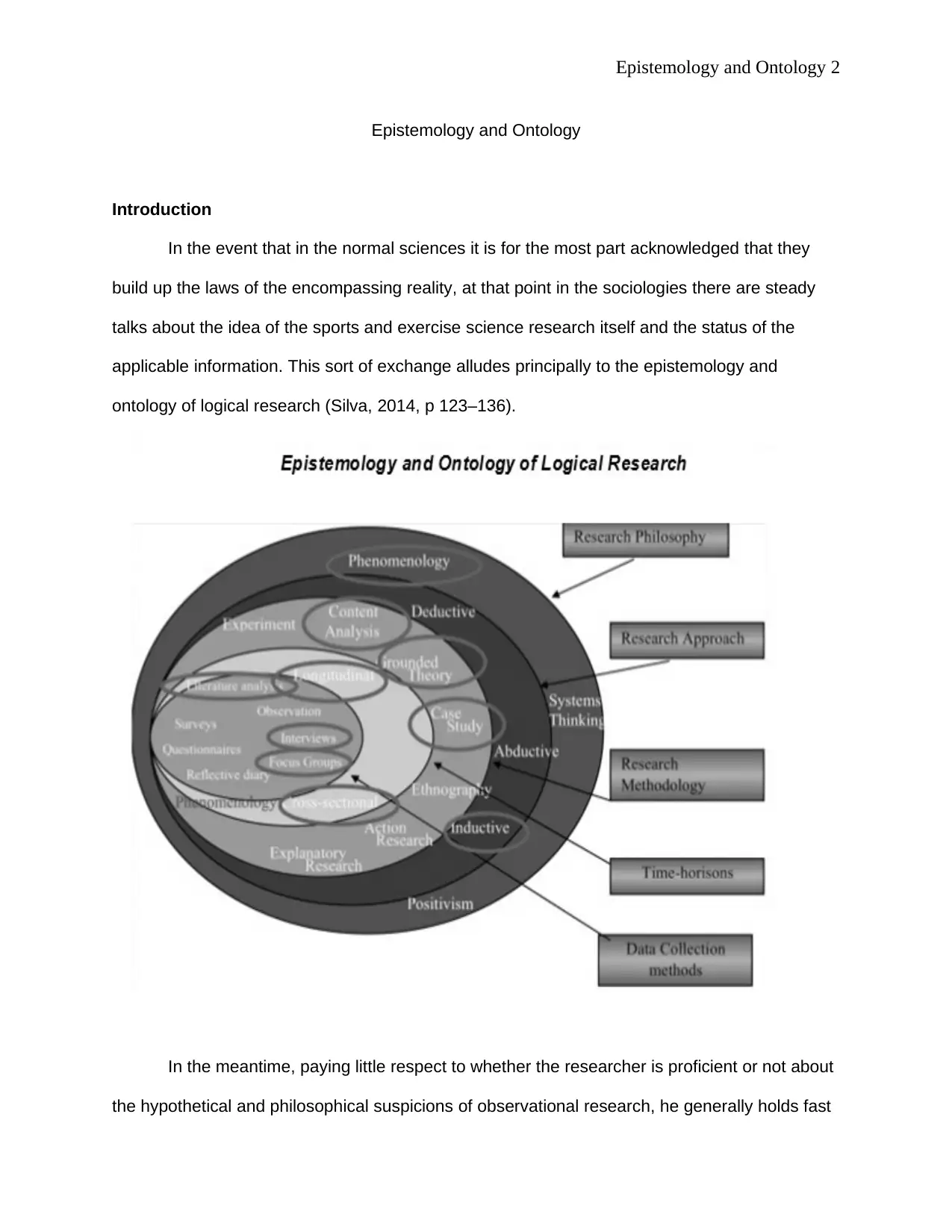
Epistemology and Ontology 2
Epistemology and Ontology
Introduction
In the event that in the normal sciences it is for the most part acknowledged that they
build up the laws of the encompassing reality, at that point in the sociologies there are steady
talks about the idea of the sports and exercise science research itself and the status of the
applicable information. This sort of exchange alludes principally to the epistemology and
ontology of logical research (Silva, 2014, p 123–136).
In the meantime, paying little respect to whether the researcher is proficient or not about
the hypothetical and philosophical suspicions of observational research, he generally holds fast
Epistemology and Ontology
Introduction
In the event that in the normal sciences it is for the most part acknowledged that they
build up the laws of the encompassing reality, at that point in the sociologies there are steady
talks about the idea of the sports and exercise science research itself and the status of the
applicable information. This sort of exchange alludes principally to the epistemology and
ontology of logical research (Silva, 2014, p 123–136).
In the meantime, paying little respect to whether the researcher is proficient or not about
the hypothetical and philosophical suspicions of observational research, he generally holds fast
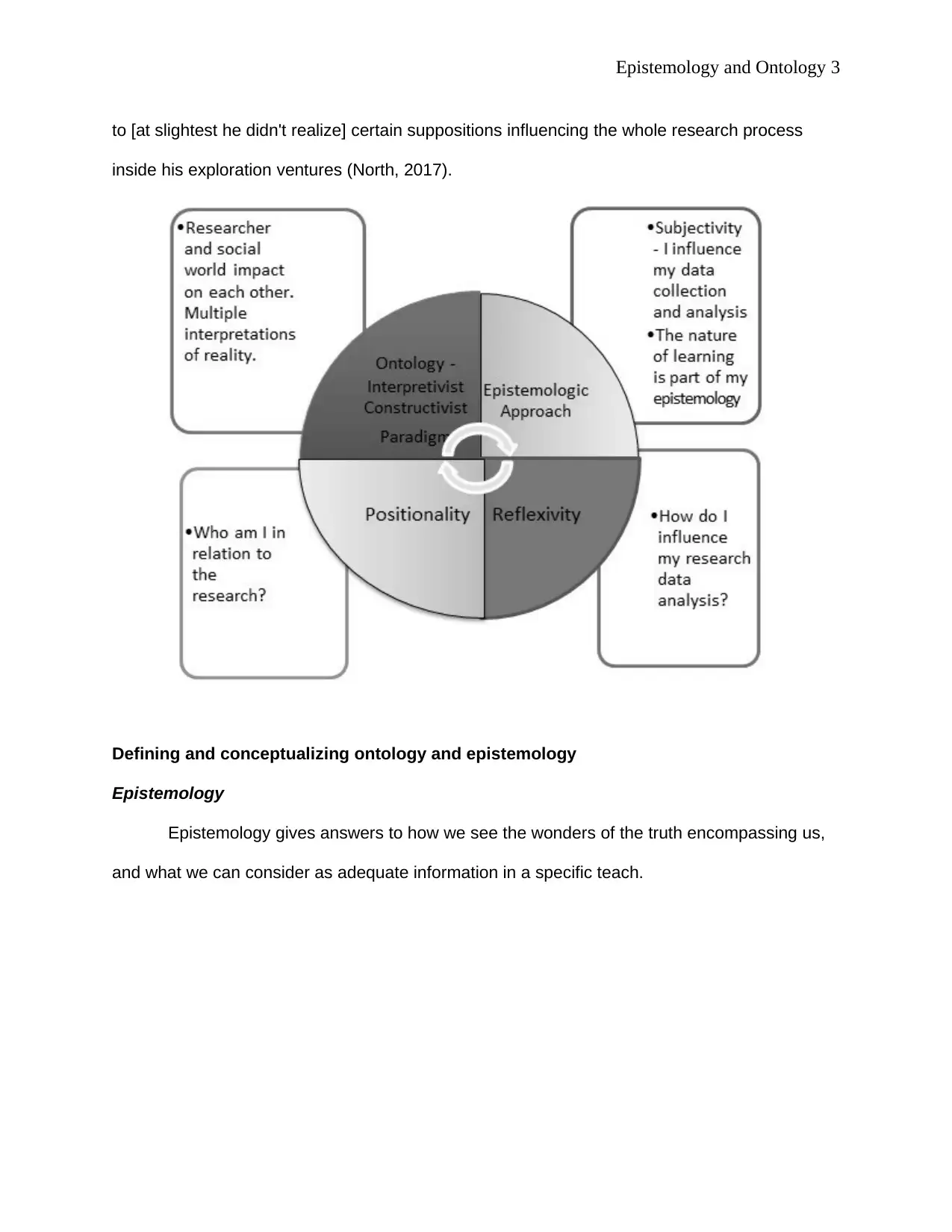
Epistemology and Ontology 3
to [at slightest he didn't realize] certain suppositions influencing the whole research process
inside his exploration ventures (North, 2017).
Defining and conceptualizing ontology and epistemology
Epistemology
Epistemology gives answers to how we see the wonders of the truth encompassing us,
and what we can consider as adequate information in a specific teach.
to [at slightest he didn't realize] certain suppositions influencing the whole research process
inside his exploration ventures (North, 2017).
Defining and conceptualizing ontology and epistemology
Epistemology
Epistemology gives answers to how we see the wonders of the truth encompassing us,
and what we can consider as adequate information in a specific teach.
⊘ This is a preview!⊘
Do you want full access?
Subscribe today to unlock all pages.

Trusted by 1+ million students worldwide
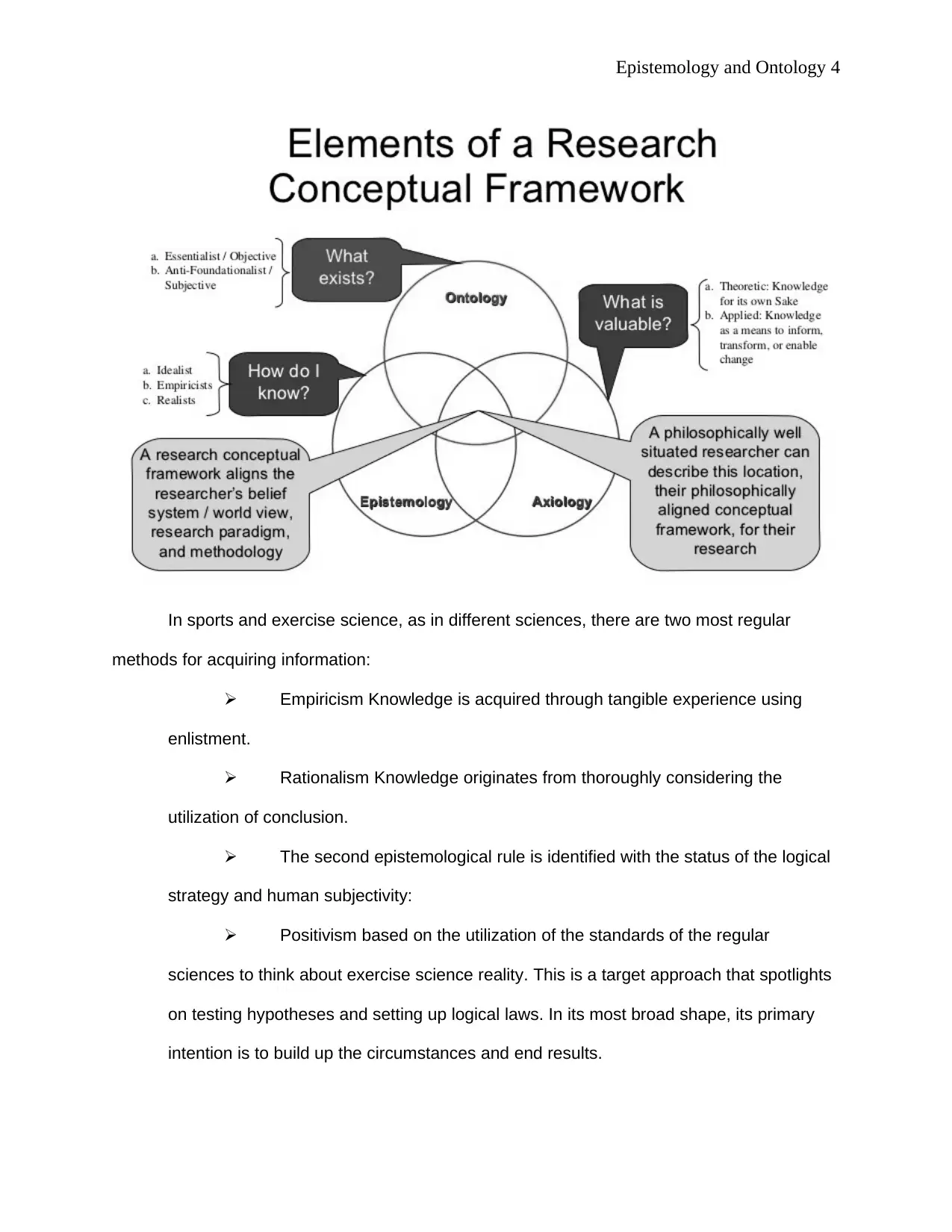
Epistemology and Ontology 4
In sports and exercise science, as in different sciences, there are two most regular
methods for acquiring information:
Empiricism Knowledge is acquired through tangible experience using
enlistment.
Rationalism Knowledge originates from thoroughly considering the
utilization of conclusion.
The second epistemological rule is identified with the status of the logical
strategy and human subjectivity:
Positivism based on the utilization of the standards of the regular
sciences to think about exercise science reality. This is a target approach that spotlights
on testing hypotheses and setting up logical laws. In its most broad shape, its primary
intention is to build up the circumstances and end results.
In sports and exercise science, as in different sciences, there are two most regular
methods for acquiring information:
Empiricism Knowledge is acquired through tangible experience using
enlistment.
Rationalism Knowledge originates from thoroughly considering the
utilization of conclusion.
The second epistemological rule is identified with the status of the logical
strategy and human subjectivity:
Positivism based on the utilization of the standards of the regular
sciences to think about exercise science reality. This is a target approach that spotlights
on testing hypotheses and setting up logical laws. In its most broad shape, its primary
intention is to build up the circumstances and end results.
Paraphrase This Document
Need a fresh take? Get an instant paraphrase of this document with our AI Paraphraser
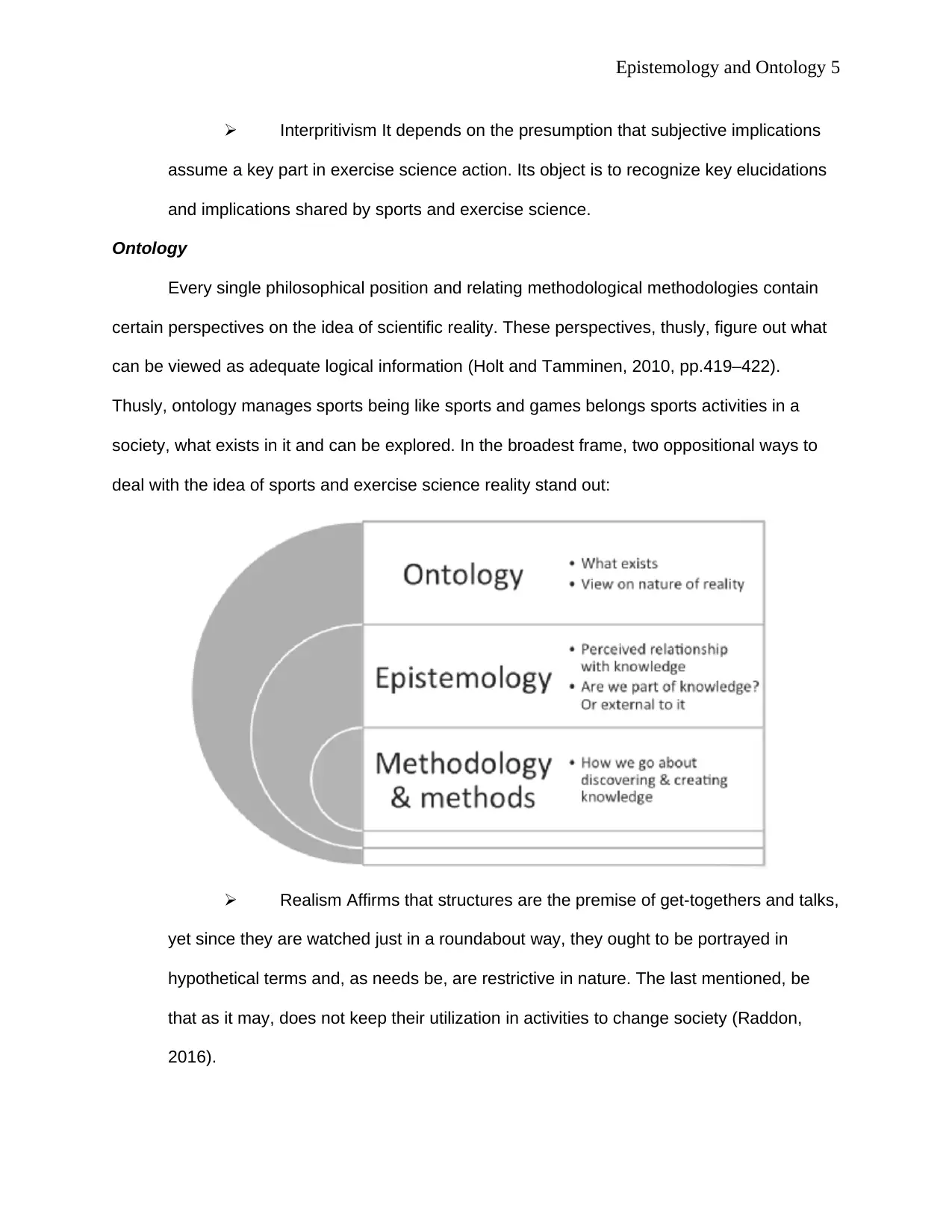
Epistemology and Ontology 5
Interpritivism It depends on the presumption that subjective implications
assume a key part in exercise science action. Its object is to recognize key elucidations
and implications shared by sports and exercise science.
Ontology
Every single philosophical position and relating methodological methodologies contain
certain perspectives on the idea of scientific reality. These perspectives, thusly, figure out what
can be viewed as adequate logical information (Holt and Tamminen, 2010, pp.419–422).
Thusly, ontology manages sports being like sports and games belongs sports activities in a
society, what exists in it and can be explored. In the broadest frame, two oppositional ways to
deal with the idea of sports and exercise science reality stand out:
Realism Affirms that structures are the premise of get-togethers and talks,
yet since they are watched just in a roundabout way, they ought to be portrayed in
hypothetical terms and, as needs be, are restrictive in nature. The last mentioned, be
that as it may, does not keep their utilization in activities to change society (Raddon,
2016).
Interpritivism It depends on the presumption that subjective implications
assume a key part in exercise science action. Its object is to recognize key elucidations
and implications shared by sports and exercise science.
Ontology
Every single philosophical position and relating methodological methodologies contain
certain perspectives on the idea of scientific reality. These perspectives, thusly, figure out what
can be viewed as adequate logical information (Holt and Tamminen, 2010, pp.419–422).
Thusly, ontology manages sports being like sports and games belongs sports activities in a
society, what exists in it and can be explored. In the broadest frame, two oppositional ways to
deal with the idea of sports and exercise science reality stand out:
Realism Affirms that structures are the premise of get-togethers and talks,
yet since they are watched just in a roundabout way, they ought to be portrayed in
hypothetical terms and, as needs be, are restrictive in nature. The last mentioned, be
that as it may, does not keep their utilization in activities to change society (Raddon,
2016).
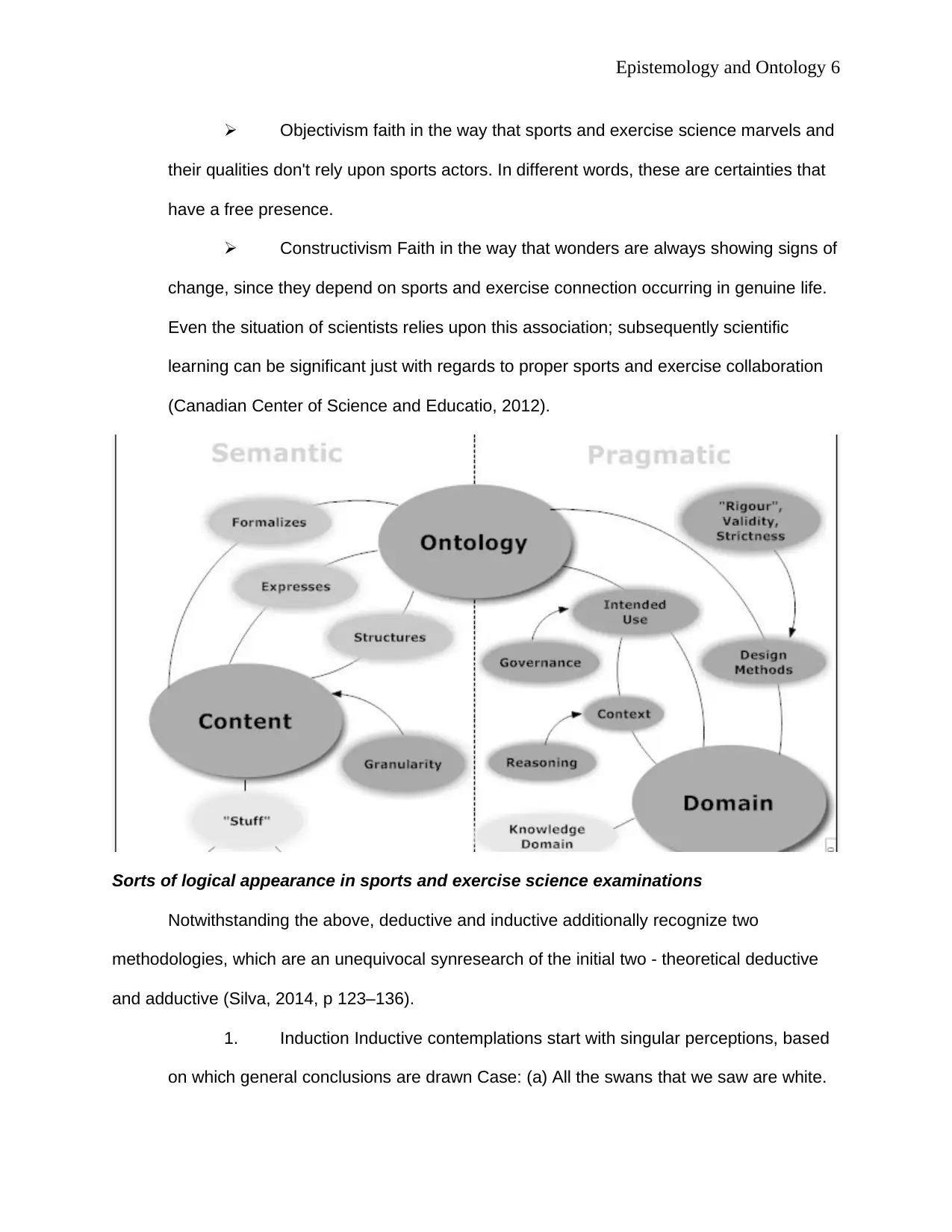
Epistemology and Ontology 6
Objectivism faith in the way that sports and exercise science marvels and
their qualities don't rely upon sports actors. In different words, these are certainties that
have a free presence.
Constructivism Faith in the way that wonders are always showing signs of
change, since they depend on sports and exercise connection occurring in genuine life.
Even the situation of scientists relies upon this association; subsequently scientific
learning can be significant just with regards to proper sports and exercise collaboration
(Canadian Center of Science and Educatio, 2012).
Sorts of logical appearance in sports and exercise science examinations
Notwithstanding the above, deductive and inductive additionally recognize two
methodologies, which are an unequivocal synresearch of the initial two - theoretical deductive
and adductive (Silva, 2014, p 123–136).
1. Induction Inductive contemplations start with singular perceptions, based
on which general conclusions are drawn Case: (a) All the swans that we saw are white.
Objectivism faith in the way that sports and exercise science marvels and
their qualities don't rely upon sports actors. In different words, these are certainties that
have a free presence.
Constructivism Faith in the way that wonders are always showing signs of
change, since they depend on sports and exercise connection occurring in genuine life.
Even the situation of scientists relies upon this association; subsequently scientific
learning can be significant just with regards to proper sports and exercise collaboration
(Canadian Center of Science and Educatio, 2012).
Sorts of logical appearance in sports and exercise science examinations
Notwithstanding the above, deductive and inductive additionally recognize two
methodologies, which are an unequivocal synresearch of the initial two - theoretical deductive
and adductive (Silva, 2014, p 123–136).
1. Induction Inductive contemplations start with singular perceptions, based
on which general conclusions are drawn Case: (a) All the swans that we saw are white.
⊘ This is a preview!⊘
Do you want full access?
Subscribe today to unlock all pages.

Trusted by 1+ million students worldwide
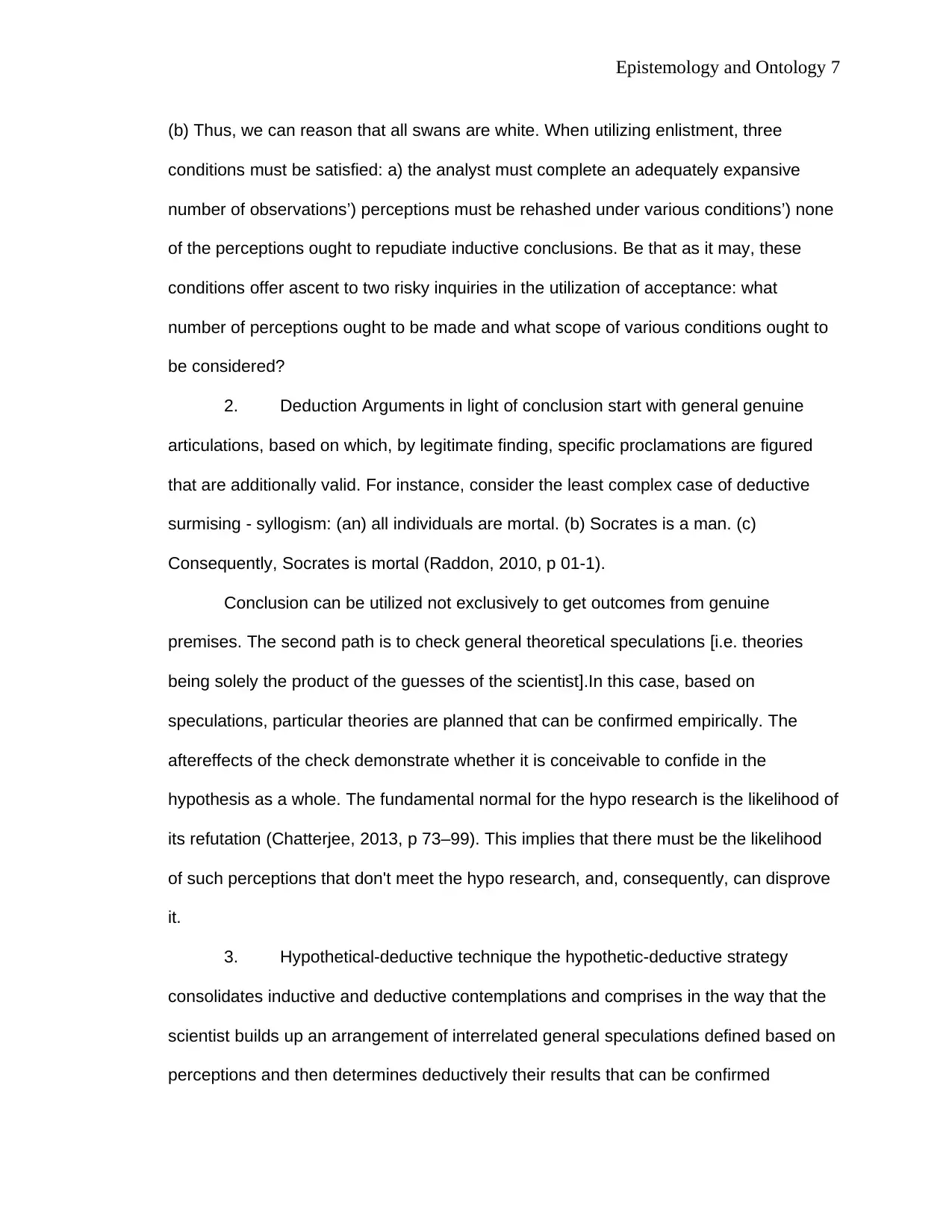
Epistemology and Ontology 7
(b) Thus, we can reason that all swans are white. When utilizing enlistment, three
conditions must be satisfied: a) the analyst must complete an adequately expansive
number of observations’) perceptions must be rehashed under various conditions’) none
of the perceptions ought to repudiate inductive conclusions. Be that as it may, these
conditions offer ascent to two risky inquiries in the utilization of acceptance: what
number of perceptions ought to be made and what scope of various conditions ought to
be considered?
2. Deduction Arguments in light of conclusion start with general genuine
articulations, based on which, by legitimate finding, specific proclamations are figured
that are additionally valid. For instance, consider the least complex case of deductive
surmising - syllogism: (an) all individuals are mortal. (b) Socrates is a man. (c)
Consequently, Socrates is mortal (Raddon, 2010, p 01-1).
Conclusion can be utilized not exclusively to get outcomes from genuine
premises. The second path is to check general theoretical speculations [i.e. theories
being solely the product of the guesses of the scientist].In this case, based on
speculations, particular theories are planned that can be confirmed empirically. The
aftereffects of the check demonstrate whether it is conceivable to confide in the
hypothesis as a whole. The fundamental normal for the hypo research is the likelihood of
its refutation (Chatterjee, 2013, p 73–99). This implies that there must be the likelihood
of such perceptions that don't meet the hypo research, and, consequently, can disprove
it.
3. Hypothetical-deductive technique the hypothetic-deductive strategy
consolidates inductive and deductive contemplations and comprises in the way that the
scientist builds up an arrangement of interrelated general speculations defined based on
perceptions and then determines deductively their results that can be confirmed
(b) Thus, we can reason that all swans are white. When utilizing enlistment, three
conditions must be satisfied: a) the analyst must complete an adequately expansive
number of observations’) perceptions must be rehashed under various conditions’) none
of the perceptions ought to repudiate inductive conclusions. Be that as it may, these
conditions offer ascent to two risky inquiries in the utilization of acceptance: what
number of perceptions ought to be made and what scope of various conditions ought to
be considered?
2. Deduction Arguments in light of conclusion start with general genuine
articulations, based on which, by legitimate finding, specific proclamations are figured
that are additionally valid. For instance, consider the least complex case of deductive
surmising - syllogism: (an) all individuals are mortal. (b) Socrates is a man. (c)
Consequently, Socrates is mortal (Raddon, 2010, p 01-1).
Conclusion can be utilized not exclusively to get outcomes from genuine
premises. The second path is to check general theoretical speculations [i.e. theories
being solely the product of the guesses of the scientist].In this case, based on
speculations, particular theories are planned that can be confirmed empirically. The
aftereffects of the check demonstrate whether it is conceivable to confide in the
hypothesis as a whole. The fundamental normal for the hypo research is the likelihood of
its refutation (Chatterjee, 2013, p 73–99). This implies that there must be the likelihood
of such perceptions that don't meet the hypo research, and, consequently, can disprove
it.
3. Hypothetical-deductive technique the hypothetic-deductive strategy
consolidates inductive and deductive contemplations and comprises in the way that the
scientist builds up an arrangement of interrelated general speculations defined based on
perceptions and then determines deductively their results that can be confirmed
Paraphrase This Document
Need a fresh take? Get an instant paraphrase of this document with our AI Paraphraser
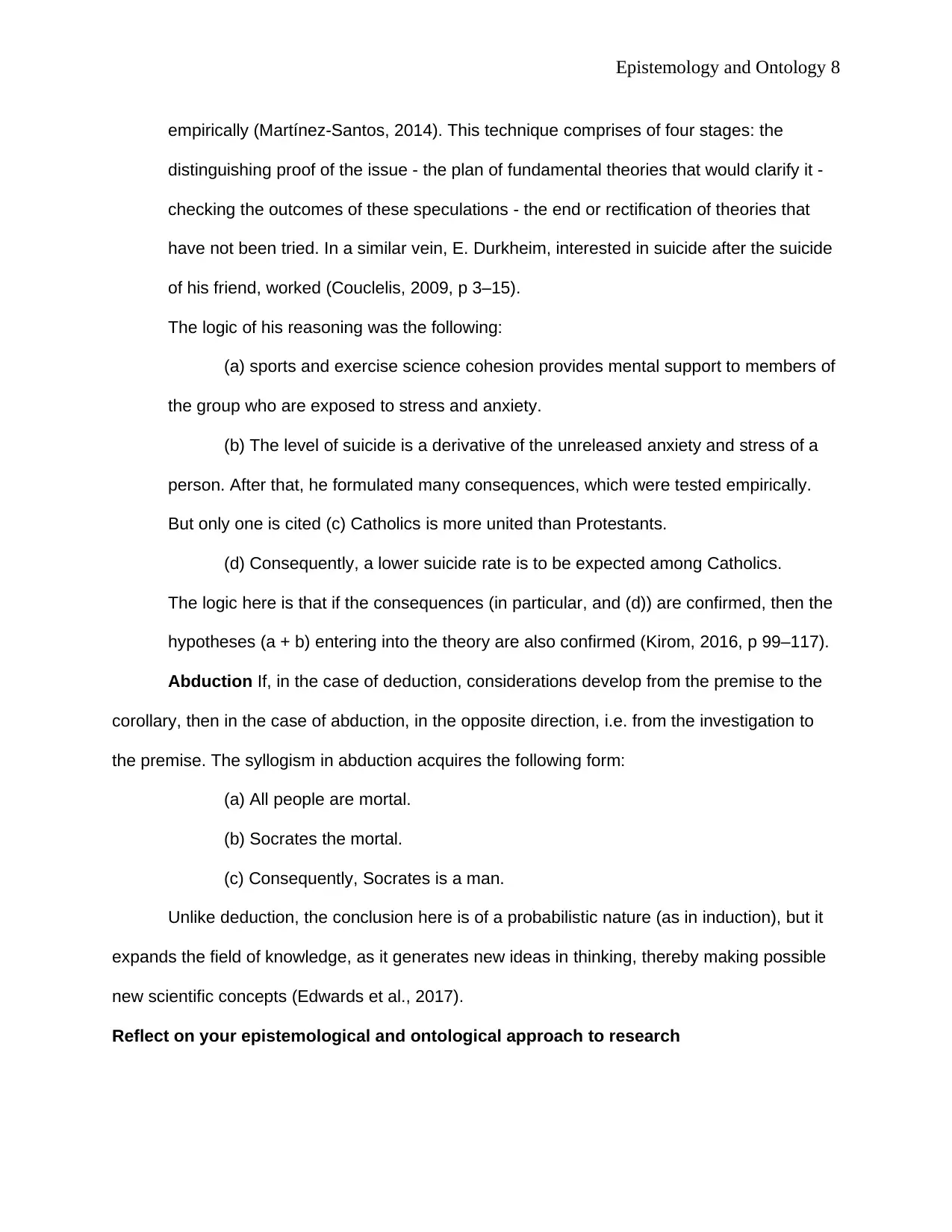
Epistemology and Ontology 8
empirically (Martínez-Santos, 2014). This technique comprises of four stages: the
distinguishing proof of the issue - the plan of fundamental theories that would clarify it -
checking the outcomes of these speculations - the end or rectification of theories that
have not been tried. In a similar vein, E. Durkheim, interested in suicide after the suicide
of his friend, worked (Couclelis, 2009, p 3–15).
The logic of his reasoning was the following:
(a) sports and exercise science cohesion provides mental support to members of
the group who are exposed to stress and anxiety.
(b) The level of suicide is a derivative of the unreleased anxiety and stress of a
person. After that, he formulated many consequences, which were tested empirically.
But only one is cited (c) Catholics is more united than Protestants.
(d) Consequently, a lower suicide rate is to be expected among Catholics.
The logic here is that if the consequences (in particular, and (d)) are confirmed, then the
hypotheses (a + b) entering into the theory are also confirmed (Kirom, 2016, p 99–117).
Abduction If, in the case of deduction, considerations develop from the premise to the
corollary, then in the case of abduction, in the opposite direction, i.e. from the investigation to
the premise. The syllogism in abduction acquires the following form:
(a) All people are mortal.
(b) Socrates the mortal.
(c) Consequently, Socrates is a man.
Unlike deduction, the conclusion here is of a probabilistic nature (as in induction), but it
expands the field of knowledge, as it generates new ideas in thinking, thereby making possible
new scientific concepts (Edwards et al., 2017).
Reflect on your epistemological and ontological approach to research
empirically (Martínez-Santos, 2014). This technique comprises of four stages: the
distinguishing proof of the issue - the plan of fundamental theories that would clarify it -
checking the outcomes of these speculations - the end or rectification of theories that
have not been tried. In a similar vein, E. Durkheim, interested in suicide after the suicide
of his friend, worked (Couclelis, 2009, p 3–15).
The logic of his reasoning was the following:
(a) sports and exercise science cohesion provides mental support to members of
the group who are exposed to stress and anxiety.
(b) The level of suicide is a derivative of the unreleased anxiety and stress of a
person. After that, he formulated many consequences, which were tested empirically.
But only one is cited (c) Catholics is more united than Protestants.
(d) Consequently, a lower suicide rate is to be expected among Catholics.
The logic here is that if the consequences (in particular, and (d)) are confirmed, then the
hypotheses (a + b) entering into the theory are also confirmed (Kirom, 2016, p 99–117).
Abduction If, in the case of deduction, considerations develop from the premise to the
corollary, then in the case of abduction, in the opposite direction, i.e. from the investigation to
the premise. The syllogism in abduction acquires the following form:
(a) All people are mortal.
(b) Socrates the mortal.
(c) Consequently, Socrates is a man.
Unlike deduction, the conclusion here is of a probabilistic nature (as in induction), but it
expands the field of knowledge, as it generates new ideas in thinking, thereby making possible
new scientific concepts (Edwards et al., 2017).
Reflect on your epistemological and ontological approach to research
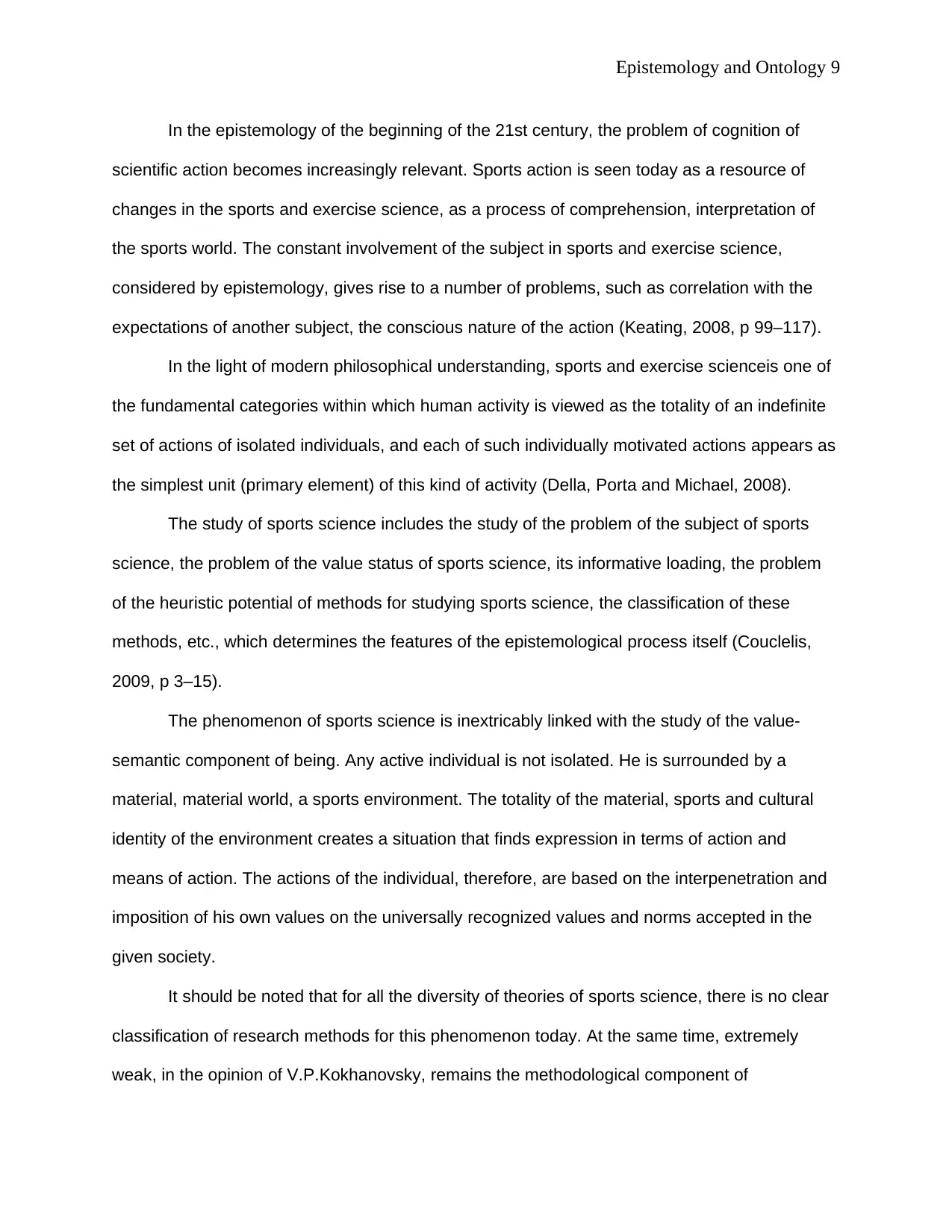
Epistemology and Ontology 9
In the epistemology of the beginning of the 21st century, the problem of cognition of
scientific action becomes increasingly relevant. Sports action is seen today as a resource of
changes in the sports and exercise science, as a process of comprehension, interpretation of
the sports world. The constant involvement of the subject in sports and exercise science,
considered by epistemology, gives rise to a number of problems, such as correlation with the
expectations of another subject, the conscious nature of the action (Keating, 2008, p 99–117).
In the light of modern philosophical understanding, sports and exercise scienceis one of
the fundamental categories within which human activity is viewed as the totality of an indefinite
set of actions of isolated individuals, and each of such individually motivated actions appears as
the simplest unit (primary element) of this kind of activity (Della, Porta and Michael, 2008).
The study of sports science includes the study of the problem of the subject of sports
science, the problem of the value status of sports science, its informative loading, the problem
of the heuristic potential of methods for studying sports science, the classification of these
methods, etc., which determines the features of the epistemological process itself (Couclelis,
2009, p 3–15).
The phenomenon of sports science is inextricably linked with the study of the value-
semantic component of being. Any active individual is not isolated. He is surrounded by a
material, material world, a sports environment. The totality of the material, sports and cultural
identity of the environment creates a situation that finds expression in terms of action and
means of action. The actions of the individual, therefore, are based on the interpenetration and
imposition of his own values on the universally recognized values and norms accepted in the
given society.
It should be noted that for all the diversity of theories of sports science, there is no clear
classification of research methods for this phenomenon today. At the same time, extremely
weak, in the opinion of V.P.Kokhanovsky, remains the methodological component of
In the epistemology of the beginning of the 21st century, the problem of cognition of
scientific action becomes increasingly relevant. Sports action is seen today as a resource of
changes in the sports and exercise science, as a process of comprehension, interpretation of
the sports world. The constant involvement of the subject in sports and exercise science,
considered by epistemology, gives rise to a number of problems, such as correlation with the
expectations of another subject, the conscious nature of the action (Keating, 2008, p 99–117).
In the light of modern philosophical understanding, sports and exercise scienceis one of
the fundamental categories within which human activity is viewed as the totality of an indefinite
set of actions of isolated individuals, and each of such individually motivated actions appears as
the simplest unit (primary element) of this kind of activity (Della, Porta and Michael, 2008).
The study of sports science includes the study of the problem of the subject of sports
science, the problem of the value status of sports science, its informative loading, the problem
of the heuristic potential of methods for studying sports science, the classification of these
methods, etc., which determines the features of the epistemological process itself (Couclelis,
2009, p 3–15).
The phenomenon of sports science is inextricably linked with the study of the value-
semantic component of being. Any active individual is not isolated. He is surrounded by a
material, material world, a sports environment. The totality of the material, sports and cultural
identity of the environment creates a situation that finds expression in terms of action and
means of action. The actions of the individual, therefore, are based on the interpenetration and
imposition of his own values on the universally recognized values and norms accepted in the
given society.
It should be noted that for all the diversity of theories of sports science, there is no clear
classification of research methods for this phenomenon today. At the same time, extremely
weak, in the opinion of V.P.Kokhanovsky, remains the methodological component of
⊘ This is a preview!⊘
Do you want full access?
Subscribe today to unlock all pages.

Trusted by 1+ million students worldwide
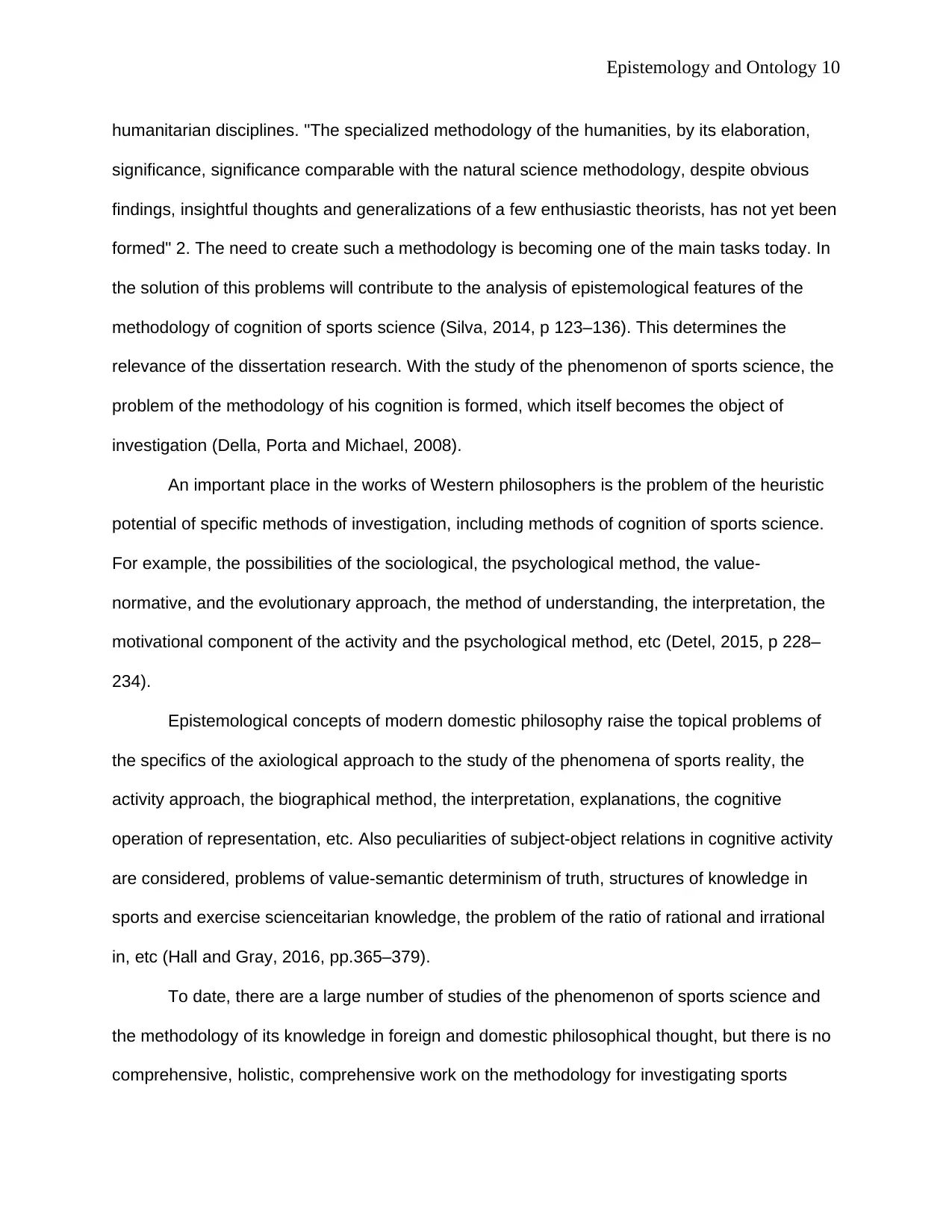
Epistemology and Ontology 10
humanitarian disciplines. "The specialized methodology of the humanities, by its elaboration,
significance, significance comparable with the natural science methodology, despite obvious
findings, insightful thoughts and generalizations of a few enthusiastic theorists, has not yet been
formed" 2. The need to create such a methodology is becoming one of the main tasks today. In
the solution of this problems will contribute to the analysis of epistemological features of the
methodology of cognition of sports science (Silva, 2014, p 123–136). This determines the
relevance of the dissertation research. With the study of the phenomenon of sports science, the
problem of the methodology of his cognition is formed, which itself becomes the object of
investigation (Della, Porta and Michael, 2008).
An important place in the works of Western philosophers is the problem of the heuristic
potential of specific methods of investigation, including methods of cognition of sports science.
For example, the possibilities of the sociological, the psychological method, the value-
normative, and the evolutionary approach, the method of understanding, the interpretation, the
motivational component of the activity and the psychological method, etc (Detel, 2015, p 228–
234).
Epistemological concepts of modern domestic philosophy raise the topical problems of
the specifics of the axiological approach to the study of the phenomena of sports reality, the
activity approach, the biographical method, the interpretation, explanations, the cognitive
operation of representation, etc. Also peculiarities of subject-object relations in cognitive activity
are considered, problems of value-semantic determinism of truth, structures of knowledge in
sports and exercise scienceitarian knowledge, the problem of the ratio of rational and irrational
in, etc (Hall and Gray, 2016, pp.365–379).
To date, there are a large number of studies of the phenomenon of sports science and
the methodology of its knowledge in foreign and domestic philosophical thought, but there is no
comprehensive, holistic, comprehensive work on the methodology for investigating sports
humanitarian disciplines. "The specialized methodology of the humanities, by its elaboration,
significance, significance comparable with the natural science methodology, despite obvious
findings, insightful thoughts and generalizations of a few enthusiastic theorists, has not yet been
formed" 2. The need to create such a methodology is becoming one of the main tasks today. In
the solution of this problems will contribute to the analysis of epistemological features of the
methodology of cognition of sports science (Silva, 2014, p 123–136). This determines the
relevance of the dissertation research. With the study of the phenomenon of sports science, the
problem of the methodology of his cognition is formed, which itself becomes the object of
investigation (Della, Porta and Michael, 2008).
An important place in the works of Western philosophers is the problem of the heuristic
potential of specific methods of investigation, including methods of cognition of sports science.
For example, the possibilities of the sociological, the psychological method, the value-
normative, and the evolutionary approach, the method of understanding, the interpretation, the
motivational component of the activity and the psychological method, etc (Detel, 2015, p 228–
234).
Epistemological concepts of modern domestic philosophy raise the topical problems of
the specifics of the axiological approach to the study of the phenomena of sports reality, the
activity approach, the biographical method, the interpretation, explanations, the cognitive
operation of representation, etc. Also peculiarities of subject-object relations in cognitive activity
are considered, problems of value-semantic determinism of truth, structures of knowledge in
sports and exercise scienceitarian knowledge, the problem of the ratio of rational and irrational
in, etc (Hall and Gray, 2016, pp.365–379).
To date, there are a large number of studies of the phenomenon of sports science and
the methodology of its knowledge in foreign and domestic philosophical thought, but there is no
comprehensive, holistic, comprehensive work on the methodology for investigating sports
Paraphrase This Document
Need a fresh take? Get an instant paraphrase of this document with our AI Paraphraser
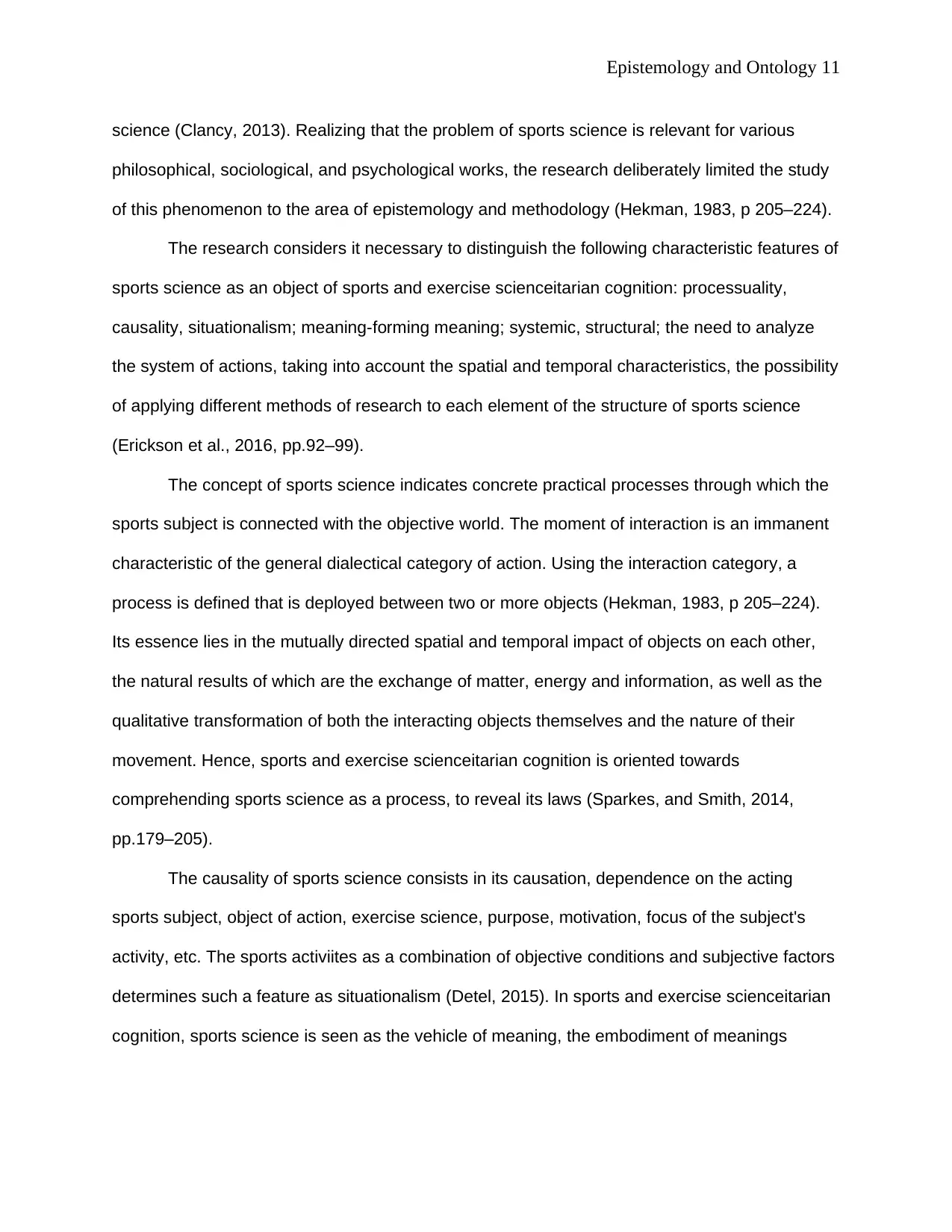
Epistemology and Ontology 11
science (Clancy, 2013). Realizing that the problem of sports science is relevant for various
philosophical, sociological, and psychological works, the research deliberately limited the study
of this phenomenon to the area of epistemology and methodology (Hekman, 1983, p 205–224).
The research considers it necessary to distinguish the following characteristic features of
sports science as an object of sports and exercise scienceitarian cognition: processuality,
causality, situationalism; meaning-forming meaning; systemic, structural; the need to analyze
the system of actions, taking into account the spatial and temporal characteristics, the possibility
of applying different methods of research to each element of the structure of sports science
(Erickson et al., 2016, pp.92–99).
The concept of sports science indicates concrete practical processes through which the
sports subject is connected with the objective world. The moment of interaction is an immanent
characteristic of the general dialectical category of action. Using the interaction category, a
process is defined that is deployed between two or more objects (Hekman, 1983, p 205–224).
Its essence lies in the mutually directed spatial and temporal impact of objects on each other,
the natural results of which are the exchange of matter, energy and information, as well as the
qualitative transformation of both the interacting objects themselves and the nature of their
movement. Hence, sports and exercise scienceitarian cognition is oriented towards
comprehending sports science as a process, to reveal its laws (Sparkes, and Smith, 2014,
pp.179–205).
The causality of sports science consists in its causation, dependence on the acting
sports subject, object of action, exercise science, purpose, motivation, focus of the subject's
activity, etc. The sports activiites as a combination of objective conditions and subjective factors
determines such a feature as situationalism (Detel, 2015). In sports and exercise scienceitarian
cognition, sports science is seen as the vehicle of meaning, the embodiment of meanings
science (Clancy, 2013). Realizing that the problem of sports science is relevant for various
philosophical, sociological, and psychological works, the research deliberately limited the study
of this phenomenon to the area of epistemology and methodology (Hekman, 1983, p 205–224).
The research considers it necessary to distinguish the following characteristic features of
sports science as an object of sports and exercise scienceitarian cognition: processuality,
causality, situationalism; meaning-forming meaning; systemic, structural; the need to analyze
the system of actions, taking into account the spatial and temporal characteristics, the possibility
of applying different methods of research to each element of the structure of sports science
(Erickson et al., 2016, pp.92–99).
The concept of sports science indicates concrete practical processes through which the
sports subject is connected with the objective world. The moment of interaction is an immanent
characteristic of the general dialectical category of action. Using the interaction category, a
process is defined that is deployed between two or more objects (Hekman, 1983, p 205–224).
Its essence lies in the mutually directed spatial and temporal impact of objects on each other,
the natural results of which are the exchange of matter, energy and information, as well as the
qualitative transformation of both the interacting objects themselves and the nature of their
movement. Hence, sports and exercise scienceitarian cognition is oriented towards
comprehending sports science as a process, to reveal its laws (Sparkes, and Smith, 2014,
pp.179–205).
The causality of sports science consists in its causation, dependence on the acting
sports subject, object of action, exercise science, purpose, motivation, focus of the subject's
activity, etc. The sports activiites as a combination of objective conditions and subjective factors
determines such a feature as situationalism (Detel, 2015). In sports and exercise scienceitarian
cognition, sports science is seen as the vehicle of meaning, the embodiment of meanings
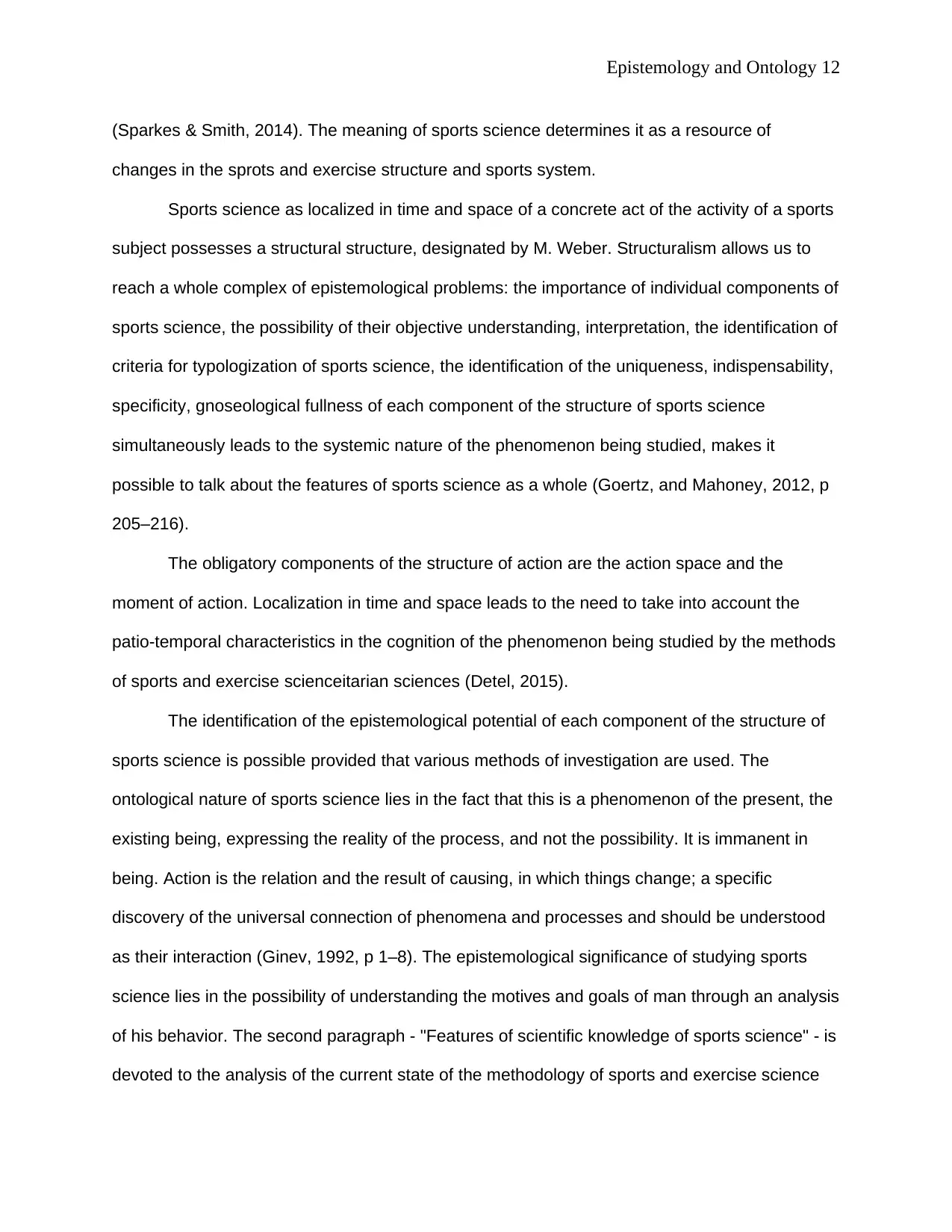
Epistemology and Ontology 12
(Sparkes & Smith, 2014). The meaning of sports science determines it as a resource of
changes in the sprots and exercise structure and sports system.
Sports science as localized in time and space of a concrete act of the activity of a sports
subject possesses a structural structure, designated by M. Weber. Structuralism allows us to
reach a whole complex of epistemological problems: the importance of individual components of
sports science, the possibility of their objective understanding, interpretation, the identification of
criteria for typologization of sports science, the identification of the uniqueness, indispensability,
specificity, gnoseological fullness of each component of the structure of sports science
simultaneously leads to the systemic nature of the phenomenon being studied, makes it
possible to talk about the features of sports science as a whole (Goertz, and Mahoney, 2012, p
205–216).
The obligatory components of the structure of action are the action space and the
moment of action. Localization in time and space leads to the need to take into account the
patio-temporal characteristics in the cognition of the phenomenon being studied by the methods
of sports and exercise scienceitarian sciences (Detel, 2015).
The identification of the epistemological potential of each component of the structure of
sports science is possible provided that various methods of investigation are used. The
ontological nature of sports science lies in the fact that this is a phenomenon of the present, the
existing being, expressing the reality of the process, and not the possibility. It is immanent in
being. Action is the relation and the result of causing, in which things change; a specific
discovery of the universal connection of phenomena and processes and should be understood
as their interaction (Ginev, 1992, p 1–8). The epistemological significance of studying sports
science lies in the possibility of understanding the motives and goals of man through an analysis
of his behavior. The second paragraph - "Features of scientific knowledge of sports science" - is
devoted to the analysis of the current state of the methodology of sports and exercise science
(Sparkes & Smith, 2014). The meaning of sports science determines it as a resource of
changes in the sprots and exercise structure and sports system.
Sports science as localized in time and space of a concrete act of the activity of a sports
subject possesses a structural structure, designated by M. Weber. Structuralism allows us to
reach a whole complex of epistemological problems: the importance of individual components of
sports science, the possibility of their objective understanding, interpretation, the identification of
criteria for typologization of sports science, the identification of the uniqueness, indispensability,
specificity, gnoseological fullness of each component of the structure of sports science
simultaneously leads to the systemic nature of the phenomenon being studied, makes it
possible to talk about the features of sports science as a whole (Goertz, and Mahoney, 2012, p
205–216).
The obligatory components of the structure of action are the action space and the
moment of action. Localization in time and space leads to the need to take into account the
patio-temporal characteristics in the cognition of the phenomenon being studied by the methods
of sports and exercise scienceitarian sciences (Detel, 2015).
The identification of the epistemological potential of each component of the structure of
sports science is possible provided that various methods of investigation are used. The
ontological nature of sports science lies in the fact that this is a phenomenon of the present, the
existing being, expressing the reality of the process, and not the possibility. It is immanent in
being. Action is the relation and the result of causing, in which things change; a specific
discovery of the universal connection of phenomena and processes and should be understood
as their interaction (Ginev, 1992, p 1–8). The epistemological significance of studying sports
science lies in the possibility of understanding the motives and goals of man through an analysis
of his behavior. The second paragraph - "Features of scientific knowledge of sports science" - is
devoted to the analysis of the current state of the methodology of sports and exercise science
⊘ This is a preview!⊘
Do you want full access?
Subscribe today to unlock all pages.

Trusted by 1+ million students worldwide
1 out of 19
Your All-in-One AI-Powered Toolkit for Academic Success.
+13062052269
info@desklib.com
Available 24*7 on WhatsApp / Email
![[object Object]](/_next/static/media/star-bottom.7253800d.svg)
Unlock your academic potential
Copyright © 2020–2025 A2Z Services. All Rights Reserved. Developed and managed by ZUCOL.